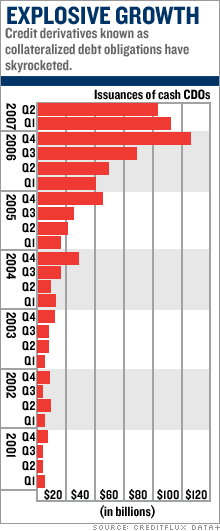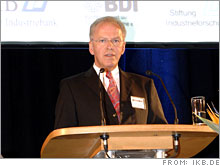Subprime on the RhineFortune's Peter Gumbel investigates how Germany's IKB Bank became the biggest international victim of America's subprime-mortgage crisis.(Fortune Magazine) -- In the highflying world of European finance, D�sseldorf-based IKB Deutsche Industriebank was hardly in the big leagues. For decades the tiny commercial bank, the 27th largest in Germany, had focused on the equivalent of sauerkraut rather than Sacher torte: loans to small and midsized German companies such as machine tool makers and at least one drainage-technology client. But in 2002, IKB began branching out into arcane areas of finance. Everything changed.
 Dirk Röthig had just taken over as head of the securitization business for IKB, and he jetted off to the industry's annual European conference, held in Barcelona every June, openly relishing the food, wine, and other hospitality lavished on him by banks trying to sell their products. He lapped them up even as he complained about how badly he was paid. An executive at a big bank that dealt with him says Röthig and IKB were dubbed "the usual suspects" because they could be counted on to buy securitized assets -- including those backed by packages of U.S. subprime mortgages -- on a regular basis. "They were always good for $150 million," he says. By all accounts, Röthig was picky about the quality of the asset-backed securities he would buy, and IKB made good profits on its business during his years there. Much of the dealing went through a structured investment vehicle he set up called Rhineland Funding, which wasn't on the bank's balance sheet. In 2005 an external advisor encouraged Röthig to cash out the portfolio and reap a windfall while the market was flying high, according to a source involved in the discussion. Röthig rejected that advice. Today IKB is by far the biggest international victim of America's subprime-mortgage crisis -- and a clear example of how the repercussions are extending far, far away around the globe. Röthig and a colleague quit IKB in early 2006 to set up their own financial boutique in a dispute partly related to pay. Röthig says his dispute involved a refusal by superiors to allow him to back off his aggressive strategy. "I made several proposals for a more sophisticated portfolio management to address expected negative market developments," he wrote in an e-mail. "These risk-management proposals were not accepted by IKB." Instead, chief executive Stefan Ortseifen went gangbusters. He pushed hard to expand the bank's activities -- just as the U.S. subprime crisis was starting to break. As late as June of this year, even as the delinquency rate by mortgage holders was soaring, IKB set up a second off-balance-sheet vehicle, called Rhinebridge, which invested massively in what's known as collateralized debt obligations, or CDOs. Then it all blew up. Rumors of huge losses at a German bank started hitting European markets in late July, and IKB's biggest shareholder, a government-owned bank called KfW Group, which has a controlling 38% stake, stepped in. It extended $10 billion in credit to IKB and promised to cover losses of up to $1.35 billion. Together, Rhineland Funding and Rhinebridge hold securities -- including CDOs backed by subprime mortgages -- that were estimated before the crisis at about $20 billion. That's bigger than either IKB's capital or the $16 billion in liquidity on its balance sheet. KfW followed up with a full-blown rescue, a $4.7 billion pool funded by a consortium of private and public-sector banks. CEO Ortseifen and chief financial officer Volker Doberanzke resigned under pressure, and German prosecutors opened a preliminary investigation into what they termed "suspicion of fraud." It all amounts to the biggest banking crisis in Germany since Herstatt Bank collapsed in 1974 after disastrous forays into the foreign-exchange market. So how did a small German lender get in so deep over its head? The answer: by design. Back in the 1990s, IKB had gained some expertise in securitization by packaging and reselling the loans of its midsized German clients. After Röthig joined IKB in 2001 from State Street Bank in Munich, that business took off. He boasts on his r�sum� that under his guidance IKB securitized $9 billion of the bank's loan portfolios and bought $15 billion worth of CDOs. On the one hand, that enabled the bank to free up capital and boost its own lending. On the other, its involvement as advisor to Rhineland enabled it to earn commission income and advisory fees -- almost $70 million last year. That made for a welcome change from thin margins and tough competition in Germany's more conventional lending market, especially as the country's economy was sluggish for the first half of this decade. Indeed, securitization was seen as a key strategy shift -- right up to the crisis. "IKB made the transition from a lender into a loan-portfolio manager many years ago and is now one of Germany's leading institutions in the area of securitization," the bank noted this spring in its annual report. Ex-CEO Ortseifen even set a hugely ambitious target for Rhineland and Rhinebridge: He wanted these conduits, which are entirely legal, to double their investments, to $40 billion. (Neither of the banks' former executives would comment for this story.) IKB was no fly-by-night operation: A senior official from the German finance ministry and a state secretary from North Rhine Westphalia's economics ministry both sit on its supervisory board, along with a roster of respected and successful German entrepreneurs. The exact size of IKB's losses and where they are -- on or off the balance sheet -- are still unclear. Other than the fact that the bank's exposure was disproportionate to its size, "we still don't really know the nature of the problems at IKB," says Gerry Rawcliffe, a managing director in banking at Fitch Ratings in London. "I suspect that at the end of this, regulators will ask themselves if this very rapid expansion [of the CDO market] has been a good thing for banks, or if the risk comes back to haunt you." New auditors are poring over the bank's books and are expected to report back in mid-September. If rumors about IKB's losses roiled Europe, details of the IKB rescue jangled nerves even further, making market players reluctant to lend to each other at all. Why, for example, was it necessary to put in place a banking pool alongside the KfW rescue? One theory is that the losses are much bigger than KfW has acknowledged. But it may be that the Germans were simply being cautious; European Union regulations don't allow for state aid to ailing banks, so KfW, as a government entity, needed to tap private-sector funds as part of the rescue to avoid legal trouble. European credit markets dried up altogether when France's BNP Paribas announced days later that it was freezing three mutual funds containing $2.2 billion in asset-backed securities -- though its total pales in comparison to IKB's mess. It took several days of massive injections of liquidity by the European Central Bank to avert a full-blown and potentially catastrophic credit squeeze. "Before IKB, the view was that the subprime problems were purely an issue for U.S. banks," says a senior French banker. "That immediately changed." The lessons of the crisis are likely to reverberate for months and perhaps lead to tougher regulation, just as the Herstatt crisis did three decades ago. Outsiders watching the drama say that one of the flaws of the asset-backed-securities market is that some buyers may have pored over the credit risk as estimated by various rating agencies, but still may not have fully appreciated the true dangers of what they were buying. "Maybe parts of the market grew too comfortable with using credit ratings as shorthand for the underlying fundamentals," says Neil McLeish, chief European credit strategist for Morgan Stanley in London. Nouriel Roubini, economics professor at New York University's Stern School of Business, who has long warned about the risk of international contagion from the subprime market, is blunter. "Most people relied on the rating agencies and were totally clueless about the underlying assets behind" the leveraged debt instruments, he says. Regulators in Germany and at EU headquarters are examining the role of credit agencies in the mess. Market watchers hope that the problems have been contained in a corner of the financial sector and, barring any further failures, won't spill into the global economy. James Nixon, an economist at Soci�t� G�n�rale in London, describes the issue as "a short-term liquidity squeeze rather than a full-blown credit crunch." At the least, the crisis is crimping the appetite for mergers and other deals. Britain's Cadbury Schweppes (Charts) is delaying the sale of its soft drink business, which includes Dr Pepper, Snapple, and 7 Up. And the impact is being felt in emerging markets. Sunil Kakkad, a lawyer in London with many Indian clients, was about to close a $50 million acquisition of a British company by an Indian tech firm when the financiers tore up the term sheet and demanded a higher premium. "The cost of deals will inevitably get higher," he says. Estimates for the total of the subprime-related securities losses vary from $50 billion to $150 billion, depending on what's factored in. It's still not clear which institutions are sitting on those losses, so lending remains sluggish. Some have quantified their exposure, including Commerzbank and Postbank in Germany, Switzerland's UBS (Charts), and the French insurer AXA (Charts), which moved $400 million into retail funds with subprime paper in order to prop them up. But nondisclosure by others is keeping speculation feverish. Some bankers say the only way forward is for institutions to come clean. "There needs to be better communication," says Marc Litzler, deputy chief executive at Calyon, the investment-banking arm of France's Cr�dit Agricole. Still, the fact that central banks didn't cut rates immediately when the crisis broke, as happened in 1998 during the Long-Term Capital Management failure, bolstered the contention of optimists that the global repercussions have been largely contained. "We're at the starting point of a more difficult environment for credit markets," McLeish says, pointing out that prices in the European high-yield market have doubled since June. He expects additional volatility in the weeks ahead, but says, "we have passed the absolute peak of that anxiety and uncertainty." For now, that is. |
Sponsors
|

